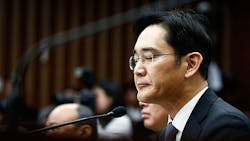Samsung Heir Denies Charges at Corruption Hearing
The heir to the Samsung business empire denies all charges in connection with a wide-ranging corruption scandal, his lawyers told the first court hearing on his case on March 9.
Lee Jae-Yong, 48, was not present at Seoul Central District court for the hearing, and is being held in custody as his giant company -- the world's biggest smartphone maker -- struggles to recover from a recall scandal.
Lee, the vice-chairman of Samsung Electronics, faces accusations of bribery, corruption, perjury and other offenses stemming from a scandal that has seen President Park Geun-Hye impeached. Four other Samsung executives have also been charged.
"Everyone denies all the charges," a defense lawyer told the court at a preliminary hearing which lasted little more than an hour.
The prosecutors' formal indictment was sketchy, with some of the accusations lacking clear evidence and only circumstantial, the defense said.
The accused paid nearly $40 million to Park's close friend Choi Soon-Sil, allegedly as bribes to secure policy favors.
Samsung has insisted that the payments were charitable contributions it was obliged to make under pressure from officials, and not bribes.
A Samsung spokeswoman referred requests for comment to a previous statement saying: "We will do our best to ensure the truth is revealed in future court proceedings."
Lee has effectively been at the helm of Samsung since his father suffered a heart attack in 2014.
One of the favors Lee allegedly sought from Park was state approval for a controversial merger of two Samsung units in 2015, seen as a key step to ensure a smooth transfer of power to him.
The deal was opposed by many shareholders who said it had wlilfully undervalued one of the two firms. But it eventually went through after the national pension fund -- a major Samsung shareholder -- approved it.
Family Ties
The next court date was not fixed, and it remained unclear when Lee's formal trial might begin as the judges suggested another preliminary hearing could be necessary to review the "extremely large" amount of evidence submitted by prosecutors.
The corruption scandal centers on Choi, who is accused of using her close ties with the president to force local firms to "donate" nearly $70 million to non-profit foundations, which Choi allegedly used for personal gain.
Samsung, South Korea's largest business group with revenues equivalent to about a fifth of the country's GDP, was the single biggest donor to the foundations.
It is also accused of separately giving millions of euros to Choi to bankroll her daughter's equestrian training in Germany.
Lee's arrest, the first for a Samsung chief even though his father was twice convicted of bribery, sent shockwaves through the company and triggered the announcement of a major reform of its top-down management style.
The scandal has cast a renewed light on the cosy ties traditionally enjoyed by the government and the family-controlled conglomerates known as "chaebols" that dominate the country's economy.
The groups have increasingly become objects of public scorn as criticisms mount over their management practices, including rapid promotions for family members -- some of whose antics have battered the firms' images.
An heir to Hanwha Group -- South Korea's eighth-largest conglomerate -- was convicted and given a suspended jail sentence on March 8 on charges including assault after a drunken brawl at a bar.
Millions of South Koreans taking part in weekly street rallies demanding Park's removal have also called for the arrest of the tycoons involved in the scandal, including the leaders of Hyundai, SK and Lotte.
The hearing on March 8 came a day before the Constitutional Court rules on whether to uphold Park's impeachment by parliament. If it does, Park would become the first-ever South Korean president to be sacked by impeachment, and a presidential election would be held within 60 days.
By Jung Ha-Won
Copyright Agence France-Presse, 2017
About the Author
Bloomberg
Licensed content from Bloomberg, copyright 2016.
